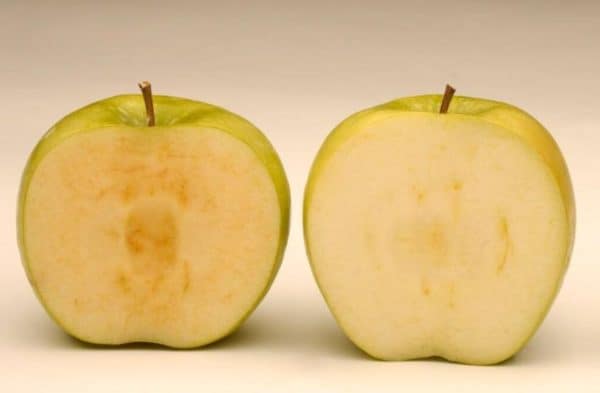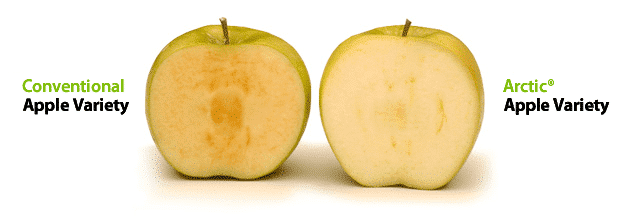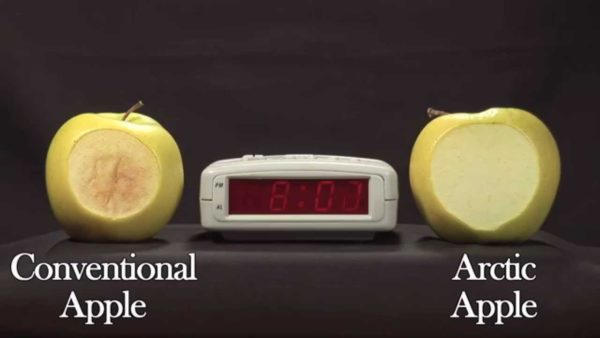
 Is Canada’s new Arctic Apple evil?
Is Canada’s new Arctic Apple evil?
It’s a story as old as the Bible. And it might be even older than that. The apple took down Adam and Eve when they decided to snack on one from a forbidden tree in the Garden of Eden.
Bad idea.
Hercules was forced to confront a hundred-headed dragon just to pick one, at which point most of us would have simply settled for the grapes.
Today in Canada, we are facing the question of whether the apple is evil. But we’re not talking about any ordinary piece of fruit. Canadians are debating the Arctic Apple. Developed in B.C. by Okanagan Specialty Fruits, the Arctic Apple is a new variety that doesn’t brown because the genes that produce polyphenol enzymes have been silenced.
Last Friday, the Canadian Food Inspection Agency and Health Canada announced they would allow the Arctic Apple to be sold within Canada, concluding that the fruit was safe.
“The science behind the Arctic apple is quite simple,” said Health Canada. “A gene was introduced into the Arctic apple that results in a reduction in the levels of enzymes that make apples turn brown when sliced. In every other way, the Arctic apple tree and its fruit are identical to any other apple.”

Of course, there are those who aren’t buying this. They see genetic modification as the very definition of evil.
“The March Against Monasanto”, a worldwide protest march against GMOs, is the crystallization of the movement. The first event took place on May 25, 2013 in more than 300 cities around the world. Anti-GMO activists believe genetically-modified foods can cause cancer, infertility, and birth defects. They advocate buying organic foods and want legislation that would label genetically modified foods.
There were very many things about Monsanto that were repeated but didn’t have much root in fact.
The undisputed hero of the anti-GMO movement is a 62-year old Indian woman named Vandana Shiva, who happened to briefly study at the University of Guelph in the 1970’s. According to journalist Bill Moyers, Shiva has become a “rock star in the worldwide battle against genetically modified seeds”.
Shiva thinks those advocating genetically modified organisms are overstepping their boundaries, and she advocates a move away from industrial farming to smaller organic farms.
“G.M.O. stands for ‘God, Move Over,’ we are the creators now,” she told a crowd last year. Shiva is a seductive speaker and she gives dozens of speeches a year worldwide, most of them about the health dangers of GMOs.
Sometimes they are not very accurate.
“The Centers for Disease Control and Prevention has said that in two years the figure of autism has jumped from one in eighty-eight to one in sixty-eight,” Shiva said in a segment of a speech about glyphosate in Winnipeg last year. “Then they go on to say obviously this is a trend showing that something’s wrong, and that whether something in the environment could be causing the uptick remains the million-dollar question.”
“That question’s been answered,” explained Shiva. “If you look at the graph of the growth of G.M.O.s, the growth of application of glyphosate and autism, it’s literally a one-to-one correspondence. And you could make that graph for kidney failure, you could make that graph for diabetes, you could make that graph even for Alzheimer’s.”
But, as The New Yorker’s Michael Specter points out, there is simply no evidence that glyphosate causes autism.

“Shiva refers to her scientific credentials in almost every appearance, yet she often dispenses with the conventions of scientific inquiry,” said Specter, who could find no evidence for the claims on her book jackets that she is, in fact, one of India’s leading physicists.
As much as a quarter of the all insecticides worldwide have been used on cotton, many of which are carcinogenic. Bt cotton, produced by Monsanto, is a genetically modified variety of cotton that produces an insecticide. Multiple studies have shown its use results in a huge reduction in pesticide spraying.
At least one actual physicist strongly disagrees with Shiva’s conclusions.
David Frieberg, a former Google executive who sold his company Climate Corp. to Monsanto in 2013, says despite the fact that the more than century-old company has battled against public perception, its critics have no real solution for the looming worldwide food shortage. He says he read every argument against the company, and was not swayed.
“There were very many things about Monsanto that were repeated but didn’t have much root in fact,” he said.
Frieberg says solutions like the ones Shiva offers have little practicality. Monsanto critics “want to live in a natural world where we’re all living in treehouses in the rainforest and picking coconuts out of the tree,” he told the Wall Street Journal. “Maybe it would be possible if we had 100,000 people living on earth, but that’s not the reality that we’re living in today.”
Genetically modified seeds, says Friedberg, allow farmers to grow robust crops with fewer resources, a must in a world in which arable land is at a premium.
One example is cotton.
As much as a quarter of the all insecticides worldwide have been used on cotton, many of which are carcinogenic. Bt cotton, produced by Monsanto, is a genetically modified variety of cotton that produces an insecticide. Multiple studies have shown its use results in a huge reduction in pesticide spraying.
Plant breeding has been around almost since the beginning of agriculture, when farmers would save a strong looking plant or seed for the use in the following season. Gregor Mendel’s work with pea plants, rediscovered decades after his death, was the quantum leap forward. Today, most of the things we use are the direct result of selecting desirable characteristics and removing undesirable ones. It’s why your Christmas tree lasts through the holidays and why your corn tastes sweeter.
This, says the Washington Post’s Alexandra Petri is the point.
“Americans tend to be less queasy about genetically modified food than Europeans. Who knows why. Perhaps it’s something they’re putting in our water,” she says. “This is in many ways a logical position — all food is genetically modified. Our wheat is bigger and more wheat-like than it was when our ancestors first harvested it. Our corn is cornier. says Petri.
Today, she might add, “…and our apples less brown”.
Below: IntelligenceSquared debates genetically modified food…
Leave a Reply
You must be logged in to post a comment.



 Share
Share Tweet
Tweet Share
Share




Comment